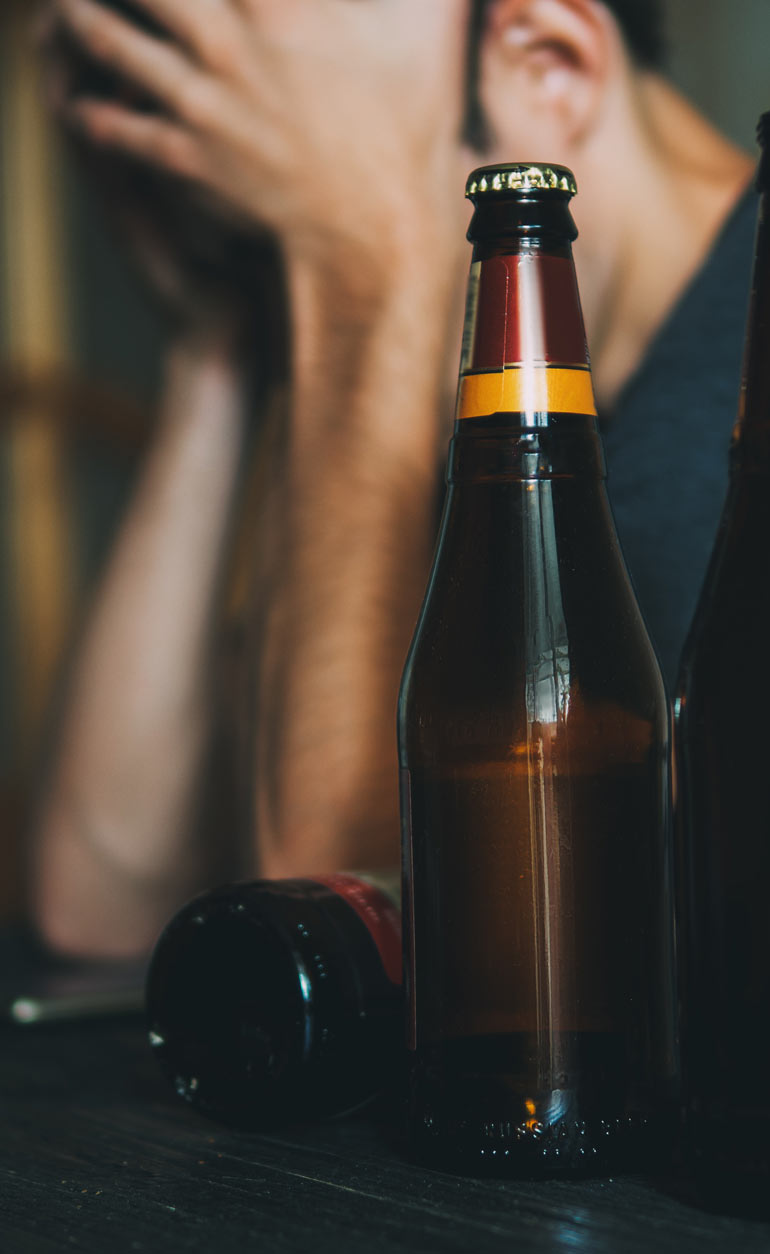Alcohol Addiction Treatment in Portsmouth & Chesapeake, VA
If you’re struggling with alcohol addiction, you are not alone. At Safe Harbor Recovery Center, we provide compassionate and evidence-based alcohol addiction treatment in Portsmouth and Chesapeake, Virginia, helping individuals regain control of their lives. Our dedicated team offers a full continuum of care designed to meet the physical, emotional, and psychological needs of each client.
Comprehensive Alcohol Addiction Treatment in Virginia
Our alcohol addiction treatment program begins with a personalized assessment to determine your current level of alcohol use, medical history, co-occurring mental health conditions, and previous treatment experiences. This information allows us to tailor a recovery plan specifically for you.
Alcohol addiction rehab is not one size fits all, which is why we use a combination of clinically proven therapies and holistic services, tailored to your individual needs, to support healing and long-term sobriety:
- Medically supervised alcohol detox
- Individual and group therapy sessions
- Cognitive Behavioral Therapy (CBT)
- Motivational Interviewing (MI)
- Trauma-informed care
- Mindfulness practices and fitness therapy
- Family education and support
- Aftercare and relapse prevention planning

Alcohol Detox and Residential Treatment in Portsmouth, VA
Our Portsmouth location provides a structured and supportive residential alcohol treatment program for individuals in the early stages of recovery. The program includes 24/7 medical supervision during detox, intensive therapeutic support, and skill-building activities to help clients manage cravings, identify triggers, and build a strong foundation for a sober lifestyle.
Outpatient Alcohol Rehab in Chesapeake, VA
For those transitioning from inpatient care or needing more flexibility, our Chesapeake facility offers a Partial Hospitalization Program (PHP) and Intensive Outpatient Program (IOP). These programs allow clients to receive high-quality alcohol addiction treatment while maintaining work, school, or family responsibilities. Outpatient alcohol treatment includes therapy, peer support, and case management focused on relapse prevention and long-term wellness.
Recognizing the Signs of Alcohol Addiction
Alcohol use disorder can impact anyone, regardless of background. Some signs that you or a loved one may need help include:
- Drinking more or longer than intended
- Experiencing withdrawal symptoms without alcohol
- Hiding or lying about drinking habits
- Losing interest in activities you once enjoyed
- Relationship, job, or legal issues due to alcohol use
Read our article on identifying common signs and symptoms of drug and alcohol addiction to learn more. If any of these symptoms sound familiar, Safe Harbor Recovery Center is here to help.
Alcoholism Dual Diagnosis Treatment for Co-Occurring Disorders
Many individuals struggling with alcohol addiction also experience mental health challenges like depression, anxiety, or PTSD. Our dual diagnosis treatment approach ensures that both substance use and mental health conditions are treated simultaneously for more effective and lasting recovery.
Aftercare and Continuing Support in Virginia
Recovery from alcohol addiction doesn’t end after detox or rehab. Safe Harbor Recovery Center offers comprehensive aftercare services, including alumni support, ongoing therapy, life skills coaching, and spiritual wellness programs. We also utilize Trac 9, a proprietary tool that monitors relapse risk and treatment readiness throughout the recovery journey.
Start Alcohol Addiction Treatment Today in Portsmouth or Chesapeake
Whether you’re seeking help for yourself or a loved one, our team is ready to guide you. With locations in Portsmouth and Chesapeake, VA, Safe Harbor Recovery Center provides accessible and personalized alcohol addiction treatment rooted in compassion, clinical excellence, and long-term success.
Contact us today to verify your insurance, ask questions, or schedule a confidential assessment. Let us help you take the first step toward a healthier, alcohol-free future.
Ready to get started? Call (888) 932-2304 to speak confidentially with an admissions specialist or you may send us a message.

Our Evaluation Methods
Beginning with the initial evaluation, Safe Harbor Recovery Center clinicians use Trac 9 to track treatment readiness, cravings, relapse risk, and the risk of early treatment termination. This assessment tool has strong empirical support and is a feature unique to Safe Harbor Recovery Center.
Residential Treatment
Residential treatment provides a structured environment for men and women in the early stages of recovery. Treatment includes intensive individual and group therapy to address the underlying issues contributing to the development of an alcohol use disorder. Guests also build the foundation for a sober lifestyle by learning to recognize triggers, manage cravings, socialize while sober, and find healthy ways to cope with stressful situations.
Continuing Care
Unfortunately, alcohol use disorder is classified as a chronic illness, meaning that recovery is an ongoing process. Even after completing residential treatment, or attending an alcohol addiction rehab, individuals are not “cured” and must continue to engage in counseling, peer support, and other recovery efforts to build a stable, sober future.
Safe Harbor Recovery Center offers extensive transitional and aftercare services designed to support ongoing recovery and prevent relapse. These plans address vital aspects such as managing co-occurring mental health disorders, developing essential life skills, nurturing spiritual wellness, and securing ongoing support systems. Individuals are also guided in setting achievable short-term and long-term goals to facilitate a smooth transition back into independent living and maintain sobriety. This holistic approach ensures a well-rounded recovery experience, promoting wellness and sustainable change.
Contact Our Virginia Addiction Treatment Center
If you’re researching drug addiction treatment options for yourself or a loved one, we’re happy to answer any questions you may have. Call today to speak with one of our admissions representatives or schedule a tour of our drug treatment facility in Portsmouth or Chesapeake, VA.
